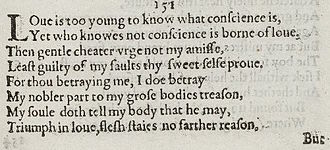Sonnet 151
Q1
Q2
Q3
C
Love is too young to know what conscience is;
Yet who knows not conscience is born of love?
Then, gentle cheater, urge not my amiss,
Lest guilty of my faults thy sweet self prove:
For, thou betraying me, I do betray
My nobler part to my gross body’s treason;
My soul doth tell my body that he may
Triumph in love; flesh stays no farther reason,
But rising at thy name doth point out thee
As his triumphant prize. Proud of this pride,
He is contented thy poor drudge to be,
To stand in thy affairs, fall by thy side.
No want of conscience hold it that I call
Her “love” for whose dear love I rise and fall.
4
8
12
14
Sonnet 151 is the 151st of 154 poems in sonnet form by William Shakespeare published in a 1609 collection titled Shakespeare's sonnets. The sonnet belongs to the Dark Lady sequence (sonnets 127–152), which distinguishes itself from The Fair Youth sequence by being more overtly sexual in its passion. Sonnet 151 is characterized as "bawdy" and is used to illustrate the difference between the spiritual love for the Fair Youth and the sexual love for the Dark Lady. The distinction is commonly made in the introduction to modern editions of the sonnets in order to avoid suggesting that Shakespeare was homosexual.
Sonnet 151 is an English or Shakespearean sonnet. The English sonnet has three quatrains, followed by a final rhyming couplet. It follows the typical rhyme scheme of the form abab cdcd efef gg and is composed in iambic pentameter, a type of poetic metre based on five pairs of metrically weak/strong syllabic positions. The 3rd line exemplifies a regular iambic pentameter:
The 8th line features two common metrical variations: an initial reversal and a final extrametrical syllable or feminine ending:
...
Wikipedia

